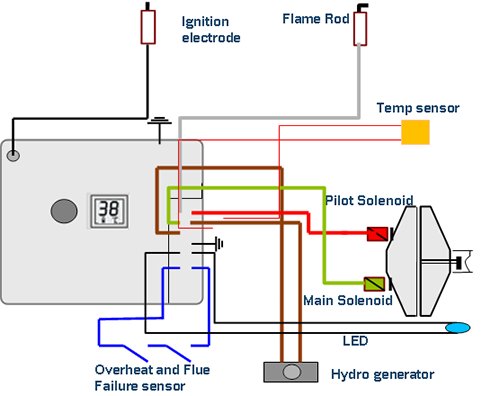
Before we jump to conclusions, let’s break this down simply. Bosch water heaters, like any other electrical appliances, are equipped with safety features that trigger error codes when something’s amiss. The LE code usually indicates a potential issue with the water heater’s flow sensor or a leak detection problem. Think of it like a car’s check engine light—it’s a signal that something needs attention, but it doesn’t necessarily mean the engine will explode the next time you drive.
Now, let’s delve deeper into understanding this error and its implications.
Understanding the Bosch Water Heater Error Code LE
When your Bosch water heater displays the LE code, it’s trying to communicate that it’s detected a problem specifically related to water flow or a possible leak. Imagine your water heater as a vigilant guardian, always on the lookout to ensure everything’s running smoothly. If it suspects anything unusual, it flashes the LE code as a cue for you to check things out.
The LE code usually stems from an obstruction in the water flow sensor. This critical component monitors how water moves through the system. If debris or mineral deposits accumulate, it clogs the sensor, much like a drain clogged with fallen leaves. Consequently, the sensor signals a discrepancy, prompting the error code.
Another possibility is that the system senses more water movement than usual, suggesting a potential leak. Think of it as pouring water into a bucket with a hole—the heater wants to ensure it’s not wasting water while protecting your home from damage. While this might sound alarming, it doesn’t necessarily point to an immediate danger, but it’s a call for timely investigation.
Common Causes of the LE Error Code
You might be wondering, “What causes these obstructions or leaks?” Well, several factors can lead up to this. First, consider mineral buildup from hard water. Over time, minerals in the water can accumulate, restricting flow like cholesterol in arteries, which can effectively trigger the LE code.
Another common cause is the incorrect installation of the water heater. If the system hasn’t been set up properly, the flow sensor might not function as it should, displaying errors. It’s much like setting up a TV without tuning it correctly—you’re bound to encounter some static along the way.
Finally, regular wear and tear or aging components might fail unexpectedly. Just like your favorite pair of sneakers, which eventually show signs of wear, your water heater also needs periodic check-ups to ensure it’s in top condition.
In these situations, the best course of action is to inspect and clean the flow sensor or seek professional assistance to rule out significant issues. Proactively caring for your water heater can prevent more serious complications.
Is It Safe to Continue Using the Heater?
The million-dollar question: Should you keep using your Bosch water heater with the LE error code showing? The short answer is: proceed with caution. It’s similar to using an umbrella with a few small holes during a drizzle—it might work for now, but don’t rely on it to protect you from a storm.
Continuing to use the water heater without addressing the cause of the LE code might not pose immediate danger, but it risks exacerbating the problem. If left unchecked, consistent error codes can lead to efficiency loss, higher energy bills, or even more severe damage, much like ignoring a strange noise in your car engine.
If the issue is a simple blockage due to mineral buildup, routine maintenance might solve it. However, if a leak is involved, a more thorough inspection is recommended to avoid water damage or electrical hazards. In such cases, reaching out to a qualified technician is the best approach to ensure safety and peace of mind.
Preventative Measures and Next Steps
Now that we’ve covered what can cause the LE code and whether it’s safe to keep using your heater, let’s talk about preventive tips to avoid this scenario in the future. Regular maintenance is crucial. Like how you’d regularly clean your coffee machine to avoid bitter brews, your water heater benefits from periodic cleaning and checks. This includes flushing the system to clear any sediment and checking for leaks.
Another useful strategy is installing a water softener if you have hard water. This helps minimize mineral buildup, keeping your heater and flow sensor in better shape over time. Think of it as adding a water filter to your tap—just a little extra step to ensure purity.
If you’re experiencing frequent LE error codes, consider scheduling an annual inspection with a professional. This proactive approach can help catch potential issues early before they become costly repairs.
By understanding the significance of the LE code and taking preventive steps, you’re not only ensuring the longevity of your Bosch water heater but also the comfort and safety of your home. Remember, a little attention goes a long way in warding off bigger problems, keeping your showers warm and stress-free.